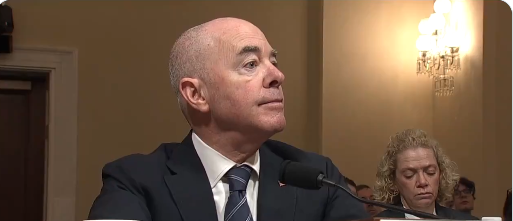Alejandro Mayorkas, the head of the Department of Homeland Security (DHS), has publicly acknowledged significant shortcomings in the U.S.’s southern border policy under the Biden administration. This policy, described by some as an “open border” experiment, has allowed approximately 10 million individuals to cross into the United States in just over three years. However, a startling revelation has come to light: the DHS admitted to not conducting immediate background checks on these individuals, which could have identified those with criminal records or terrorist affiliations.
🚨JUST IN: Secretary Alejandro Mayorkas institutes a new border policy in which border agents must cross their fingers before releasing caught illegal immigrants into the country. pic.twitter.com/6MsSymGnYx
— U.S. Ministry of Truth (@USMiniTru) May 23, 2024
The issue stems from the DHS’s procedural delays in conducting these checks, opting instead to wait until asylum hearings that could take years to occur. During this waiting period, individuals are allowed to remain within the U.S., posing a potential security risk. In response, a new regulation has been proposed to expedite the deportation of individuals identified as threats, allowing for quicker action to be taken during the initial credible fear screenings shortly after an individual is encountered.
Critics argue that the foundation of this policy is flawed, as it operates under the assumption that all those crossing are fleeing persecution based on race, religion, nationality, membership in a particular social group, or political opinion, as stipulated by U.S. immigration law. However, it appears that the majority of these crossings are motivated by economic hardship rather than the traditional criteria for asylum.
The proposed changes by Mayorkas aim to correct these policy oversights by allowing for immediate action against known criminals or suspected terrorists rather than deferring decisions until an asylum hearing. This shift reflects a significant change in strategy, intended to address the direct threats posed by individuals who might exploit the asylum system to remain in the country.
Why does impeached DHS Sec. Alejandro Mayorkas refuse to answer when asked if our country is safer today under his and Joe Biden's open-borders policies than before 9/11? pic.twitter.com/w1SeDO6kxJ
— SpeedySMM (@speedysmm) May 22, 2024
This policy adjustment is yet to be implemented and is pending a public comment period, suggesting that it may not take effect until later in the summer. The delay in implementation and the historical leniency of the border policy raise questions about the administration’s urgency and effectiveness in handling border security and immigration reform. Critics are urging for more immediate actions to be taken, especially given past lapses that have allowed potentially dangerous individuals to enter and remain in the U.S.
The case of Jose Ibarra, suspected of murder, underscores the potential consequences of these policy failures. After illegally crossing the border, Ibarra was paroled and moved freely within the U.S., despite his arrest record, until the alleged murder occurred. This incident, among others, highlights the critical need for reform in how the U.S. handles border security and immigration, especially concerning individuals with criminal backgrounds or potential ties to terrorism.
Moreover, DHS and the FBI have issued warnings about possible threats from foreign terrorist organizations, particularly against LGBTQIA+ events, indicating a heightened state of alert about international terrorism. This concern is compounded by recent security breaches at military facilities, involving individuals who had crossed the border and were later identified on a terrorism watch list.
These developments paint a concerning picture of the current state of U.S. border policy and immigration management, emphasizing the need for more stringent measures to ensure national security and public safety. The ongoing policy revisions and the administration’s response will be crucial in addressing these systemic issues and mitigating potential threats.
Major Points
- DHS chief Alejandro Mayorkas acknowledged that the previous southern border policy allowed criminals and terrorists into the U.S. due to delayed background checks until asylum hearings.
- A new regulation has been proposed to expedite deportations and improve security by conducting immediate screenings and background checks.
- Approximately 10 million individuals have crossed into the U.S. over the past three years under what has been termed an “open border” experiment.
- The majority of these individuals are motivated by economic hardship rather than the criteria for asylum such as persecution based on race, religion, or political opinion.
- The new policy changes are pending public comment and will not be implemented until later in the summer, raising concerns about the urgency and effectiveness of the administration’s response to border security.
Conner T – Reprinted with permission of Whatfinger News



